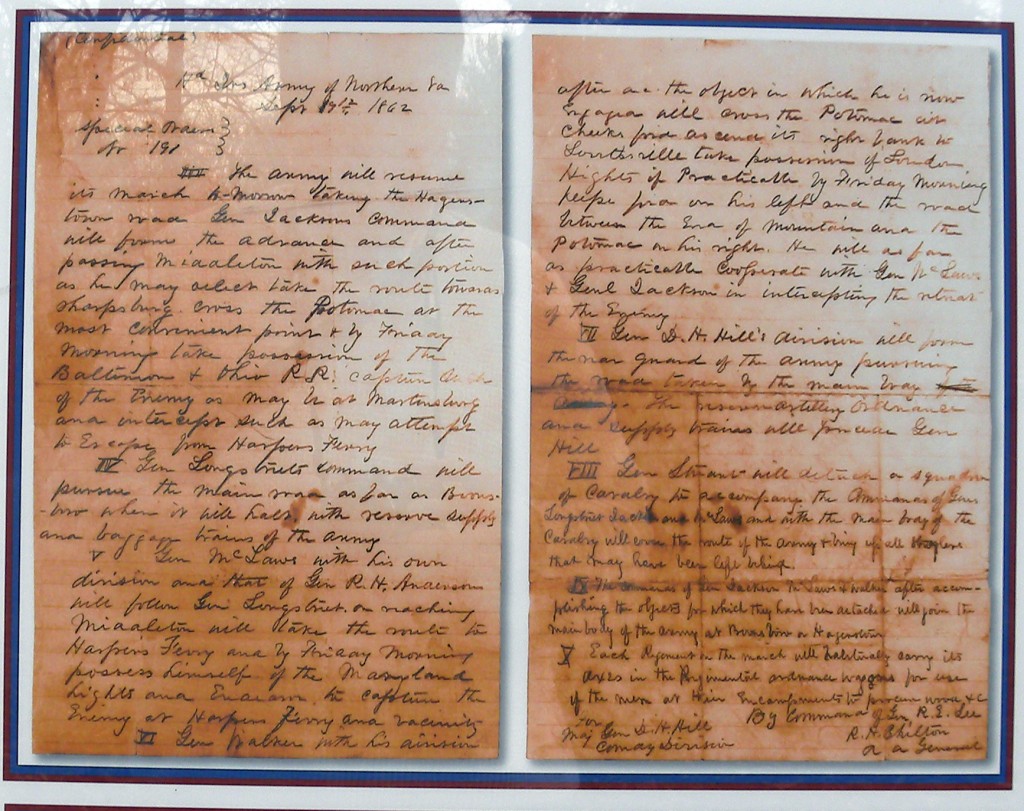Good morning, Whitewater.
Sunday will be lovely, with sunny skies and a high of seventy-one. Sunrise is 6:33 and sunset 7:07, for 12h 34m 49s of daytime. We’ve a new moon today.
The Friday FW poll asked readers how many regular-season games the Packers would win this year. A majority of respondents (52.17%) thought that they would win 12 or 13 games, with just over a quarter expecting ten or eleven wins.
On this day in 1862, a Union soldier discovers Special Order 191, a document with Confederate battle plans:
The order was drafted on or about September 9, 1862, during the Maryland Campaign. It gave details of the movements of the Army of Northern Virginia during the early days of its invasion ofMaryland. Lee divided his army, which he planned to regroup later: according to the precise text Maj. Gen.Stonewall Jackson was to move his command to Martinsburg while McLaws’s command and Walker’s command “endeavored to capture Harpers Ferry.” Maj. Gen. James Longstreet was to move his command northward to Boonsborough. D. H. Hill‘s division was to act as rear guard on the march from Frederick.
Lee delineated the routes and roads to be taken and the timing for the investment of Harpers Ferry. Adjutant Robert H. Chilton penned copies of the letter and endorsed them in Lee’s name. Staff officers distributed the copies to various Confederate generals. Jackson in turn copied the document for one of his subordinates, Maj. Gen. D. H. Hill, who was to exercise independent command as the rear guard. Hill said the only copy he received was the one from Jackson.[1]
About noon [2] on September 13, Corporal Barton W. Mitchell of the 27th Indiana Volunteers, part of the Union XII Corps, discovered an envelope with three cigars wrapped in a piece of paper lying in the grass at a campground that Hill had just vacated. Mitchell realized the significance of the document and turned it in to Sergeant John M. Bloss. They went to Captain Peter Kopp, who sent it to regimental commander Colonel Silas Colgrove, who carried it to the corps headquarters. There, an aide to Brig. Gen.Alpheus S. Williams recognized the signature of R. H. Chilton, the assistantadjutant general who had signed the order. Williams forwarded the dispatch to Maj. Gen. George B. McClellan, the commander of the Army of the Potomac. McClellan was overcome with glee at learning planned Confederate troop movements and reportedly exclaimed, “Now I know what to do!” He confided to a subordinate, “Here is a paper with which, if I cannot whip Bobby Lee, I will be willing to go home.”[3]
As it turns out, McClellan did stop Lee’s advance, but without making the most of the encounter. McClellan later did go home, so to speak, twice: when Lincoln relieved him of command, and when Lincoln later defeated McClellan in the 1864 presidential election.

